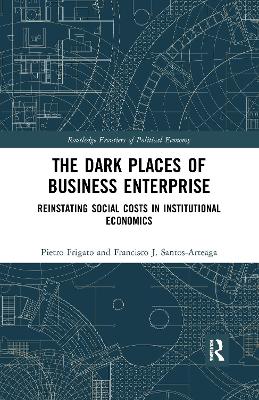Routledge Frontiers of Political Economy
2 total works
Social Costs and Public Action in Modern Capitalism
by Wolfram Elsner, Pietro Frigato, and Paolo Ramazzotti
The Social Costs approach to the globalised capitalist market economy has gained new relevance in recent years. The present situation is one of widespread and increasing deterioration of the social, cultural, democratic, and environmental frameworks of advanced capitalist market societies. This deterioration is indicated by the threats of unemployment, precarious working conditions and increasing income/status inequality, uneven geographical developments, and the exploitation and undermining of the institutional fabric of the society. It is aggravated by the rapid extension - at local, national, regional and global scales - of ecological disruption. So the global capitalist market economy is characterised by a great deal of instability and so-called true uncertainty, which largely undermine its coordinating and welfare-enhancing capacity.
The view suggested by Karl William Kapp's seminal evolutionary open-systems approach is that these processes and problems are the outcome of a widening gap between private individualist economic, and societal values or, to use Karl Polanyi's terms, of the ever increasing disembeddedness of the economy from society and of the subjugation of society to the economy. The key actor in this process is business or, more specifically, it is the increasingly dominant, globalised, deregulated and disembedded hierarchical and power system of business enterprise.
Current analyses of the global capitalist market economy are overdue to be undertaken making use of the powerful analytic frame of Karl William Kapp's open systems economics. 'Social Costs and Public Action in Modern Capitalism' examines this approach from a theoretical, conceptual, empirical, policy and case study level.
The Dark Places of Business Enterprise
by Pietro Frigato and Francisco J. Santos-Arteaga
This book considers Thorstein Veblen’s central preoccupation with the dark places of business enterprise, an integral part of the old institutional economics. Combining the contributions made by Karl William Kapp and Philip Mirowski, it proposes the systematization of an adjourned institutional theory of social costs of business enterprise useful for the analysis of contemporary crises.
The Dark Places of Business Enterprise explores the research potential of the theory of social costs for the analysis of actual business behavior in the current globalized privatization regime. It begins with a detailed outline of Veblen’s critique of business enterprise and market competition before illustrating the methodical enrichment of this approach through Kapp’s work. Finally, it concludes by proposing the integration of the Veblenian-Kappian approach with Mirowski’s theory of markets and business doubt manufacture. The resulting theory of social costs will shed light on the ubiquitous business control of society under the now dominant computer-based technological infrastructure.
This interdisciplinary foundation of the theory of social costs, encompassing knowledge from computer science and engineering to natural sciences, provides the tools required to analyze this great transformation.

